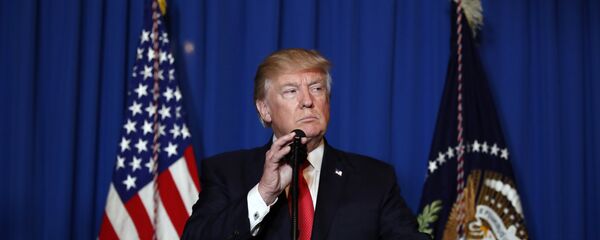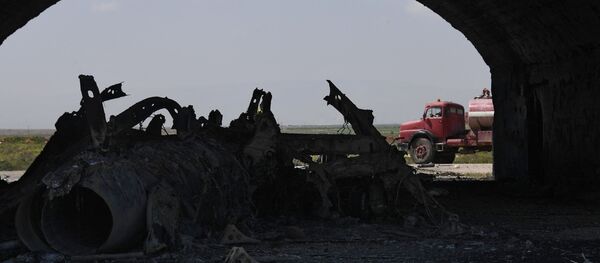On Thursday night, the United States launched 59 Tomahawk cruise missiles at a Syrian government air base at Sha'irat. President Donald Trump said the bombardment was in response to a chemical attack on civilians in Syria's Idlib that killed more than 80 people, including children — something Damascus has staunchly denied.
"I don't think that the alleged gas attacks were the motivation for the cruise missile strikes. I mean, Washington immediately accused Syrian forces of responsibility for the attack before anyone had any time to make an assessment," Stephen Gowans, the author of "Washington's Long War on Syria," told Radio Sputnik's Brian Becker.
"The Organization for the Prohibition of Chemical Weapons refuses to comment until it carries out an investigation, and unless the United States was itself complicit in the events…it can have no certain knowledge either whether chemical agents were really used or who used them."
Gowans pointed out that not only has Washington held Damascus responsible in advance of any facts, all accusations have come from groups that have some sort of interest in smearing the Syrian government.
Gowans believes the attack was a one-off and unlikely betokens a new phase of the Trump administration's foreign policy.
"I think the motivation can be found more in internal US politics that in US foreign policy," he said, implying that the move helped mute critics of the new US president within the establishment at a critical time.
However, he emphasized that by comparison with other measures undertaken by the US to bring about regime change in Syria, the strikes were "fairly minor" and didn't have the same kind of devastating impact that the insurgencies and sanctions have had.
"Contrast this limited attack on an airfield with an insurgency, now in its seventh year, which the United States has had the principal hand in igniting and sustaining… And then, there is the devastation of 14 years of economic and financial blockade. And these things are far more significant," he claimed.
Gowans stressed that the larger goal behind US policy in the region has always been to oust Arab nationalist influence, and this goal has persisted from one administration to another.
However, Gowans believes the agenda of regime change hasn't ever been abandoned, and there was only the recognition of the fact that the Syrian government under Assad was not going to be ousted in the nearest future.
"That does not mean that the United States has abandoned that goal. We can contrast what the Trump administration is doing versus what the Obama administration was doing. Obviously, the Obama administration was initially looking at very fairly short-term projective regime change, and then they had to balance this against ISIS (Daesh)," he said.
"The Obama administration's approach to ISIS was to manage ISIS, not to defeat it but to allow it to exist so that it put pressure on the Syrian government but didn't become so strong that it threatened to seize power in Baghdad or Damascus.
"The Trump administration seems to shift its emphasis [toward] destroying ISIS, but…the intention of destroying ISIS was to displace…with a biddable US proxy with the objective of essentially partitioning Syria which would then weaken the Arab nationalist forces."




